Rob Mclennan's Blog, page 336
August 12, 2016
Queen Mob's Teahouse : Kate Schapira + Valerie Witte co-interview,
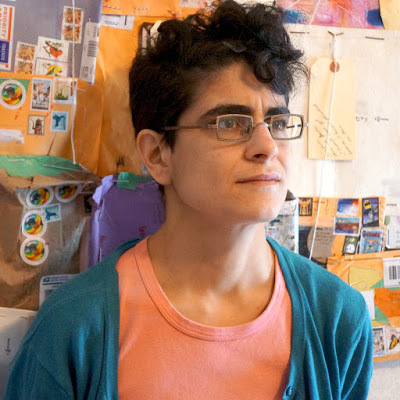 As my tenure as interviews editor at Queen Mob's Teahouse continues, the thirteenth interview is now online:
Co-Interview: Kate Schapira [pictured] + Valerie Witte
. Other interviews from my tenure include: an interview with poet, curator and art critic Gil McElroy, conducted by Ottawa poet Roland Prevost, an interview with Toronto poet Jacqueline Valencia, conducted by Lyndsay Kirkham, an interview with Drew Shannon and Nathan Page, also conducted by Lyndsay Kirkham, an interview with Ann Tweedy conducted by Mary Kasimor, an interview with Katherine Osborne, conducted by Niina Pollari, an interview with Catch Business, conducted by Jon-Michael Frank, a conversation between Vanesa Pacheco and T.A. Noonan, "On Translation and Erasure," existing as an extension of Jessica Smith's The Women in Visual Poetry: The Bechdel Test, produced via Essay Press, Five questions for Sara Uribe and John Pluecker about Antígona González by David Buuck (translated by John Pluecker), and kaie kellough in correspondence with Eric Schmaltz.
As my tenure as interviews editor at Queen Mob's Teahouse continues, the thirteenth interview is now online:
Co-Interview: Kate Schapira [pictured] + Valerie Witte
. Other interviews from my tenure include: an interview with poet, curator and art critic Gil McElroy, conducted by Ottawa poet Roland Prevost, an interview with Toronto poet Jacqueline Valencia, conducted by Lyndsay Kirkham, an interview with Drew Shannon and Nathan Page, also conducted by Lyndsay Kirkham, an interview with Ann Tweedy conducted by Mary Kasimor, an interview with Katherine Osborne, conducted by Niina Pollari, an interview with Catch Business, conducted by Jon-Michael Frank, a conversation between Vanesa Pacheco and T.A. Noonan, "On Translation and Erasure," existing as an extension of Jessica Smith's The Women in Visual Poetry: The Bechdel Test, produced via Essay Press, Five questions for Sara Uribe and John Pluecker about Antígona González by David Buuck (translated by John Pluecker), and kaie kellough in correspondence with Eric Schmaltz.Further interviews I've conducted myself over at Queen Mob's Teahouse include: Stephanie Bolster on Three Bloody Words, Claire Farley on Canthius, Dale Smith on Slow Poetry in America, Allison Green, Meredith Quartermain, Andy Weaver, N.W Lea and Rachel Loden.
If you are interested in sending a pitch for an interview my way, check out my "about submissions" write-up at Queen Mob's; you can contact me via rob_mclennan (at) hotmail.com
Published on August 12, 2016 05:31
August 11, 2016
my Patreon patron-only blog : Obituaries (and how writing them sucks,
Since building myself a
Patreon author page
, I've also been posting to a password-protected patron-only blog. I thought it might be worth reprinting the occasional post here, for the sake of general interest. Perhaps it might be worth tossing a ducat or two towards?
Here's a post from a month or so ago:
Here's a post from a month or so ago:
We lost Ottawa poet and musician Bill Hawkins [archival photo provided by Cameron Anstee, who did a lovely write-up as well] this week. That was a tough one, and a death I’m still reeling from, having not only known Bill as a friend since somewhere in the late 1990s/early 2000s, but someone I’d been fortunate enough to be able to publish: I took a tweaked version of the manuscript of selected poems put together by Noel Evans to Broken Jaw Press to appear as part of my ‘cauldron books’ series, appearing as Dancing Alone: Selected Poems 1960-1990 (2005)—the launch for which was the biggest poetry launch ever held, before or since, at the National Library and Archives of Canada, with some two hundred and fifty-plus in attendance—and we even produced a chapbook of new material two years later, the black prince of bank street(above/ground press, 2007). I’m pleased to know that I was also able to assist as co-publisher (with Christine McNair, who designed the book as well) of Cameron Anstee’s brilliantly and thoroughly-researched The Collected Poems of William Hawkins (Chaudiere Books, 2015), a book Bill was incredibly proud of (the first book he was finally able to dedicate to his mother).
Obituaries, generally, are tough to write. I’d read once that Robert Creeley offered that the (up to that point) last third of his writing career had been composing obituaries for all of his friends. I’d rather that than the other options, true. I usually drop everything and attempt to get something posted as soon as possible, in part to be able to notify the literary community, as quickly as I can, but also in a way that provides real information to who that writer was. Writing can be a tough enough game, and one filled with so much silence, especially from writers who aren’t producing new material regularly, that if we can’t tell each other when one of us dies, then the entire enterprise should be abandoned. I was a bit frustrated, for example, to only hear about a prairie poet’s death some months after she’d died; the writer’s organizations she’d previously belonged to hadn’t said a word, nor had her local community reached out to those same organizations. It feels important to inform.
I’ve written, it feels, a mound of obituaries over the years, for close friends and acquaintances both, and for writers for whom I was only familiar through their writing. When a writer dies, an acknowledgment becomes absolutely essential. I know I’ve been unable to write the occasional one, but a list of the obituaries I’ve written and posted to the blog over the past decade or so include: William Hawkins, Ken Stange, Mark McCawley, D.G. Jones, Judith Fitzgerald, Jamie Reid, Peter Culley, Joanne Page, Hillary Gravendyck, Crad Killodney, Bill Knott, Patrick White, Richard Truhlar, Anselm Hollo, Elizabeth Brewster, Raymond Souster, Daryl Hine, Andrew Suknaski, Robert Kroetsch, John Lavery, Gary Hyland, Barbara Godard, Paul Quarrington, Barbara Caruso, Sonja Skarstedt, Gerry Gilbert, David Bromige, Robin Blaser, Steve Sauvé, Billy Little, Rowland Smith, James Reaney, Jane Rule, Jane Jordan, Margaret Avison, Nancy Shaw, Birk Sproxton, Riley Tench and Irving Layton. I’ve also posted a number for family and non-writerly friends, as well, including Don Page, Siobhan Rock-Zych, Jesse McIntosh McLennan Hudson, Joanne McLennan(my mother) and Bob Page.
The list exhausts, in its own way.
I understand a certain part of it, “when one gets to a certain age,” and all that, especially as it relates to parents and other older relatives. But it still, occasionally, wears one down. I want there not to be death, I suppose. Or perhaps I don’t even mean that. When someone close to us dies, it is simply a new absence one needs to get used to, some of whom were tougher than others. Hawkins, Fitzgerald, Lavery, Suknaski, Tench. Siobhan. My mother. I had even made loose plans to meet up with Quarrington, at some point. All of that gone. What else can we do but commemorate, but acknowledge? If we aren’t working to record and remember, doesn’t that become disrespectful? How does one “honour their memory” through silence?
Or perhaps this is simply the same impulse that, for me, writing comes from: write it all down.
“I remember.”
Published on August 11, 2016 05:31
August 10, 2016
12 or 20 (second series) questions with Cati Porter
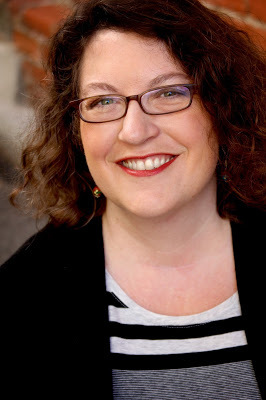 Cati Porter
is the author of
Seven Floors Up
,
My Skies of Small Horses
, and five chapbooks, most recently
The Body, Like Bread
. Her third full-length collection,
The Body at a Loss
, is forthcoming from CavanKerry Press. She is founder and editor of
Poemeleon: A Journal of Poetry
and executive director of the Inlandia Institute. She lives in Riverside, California, with her husband and two teenage sons.
Cati Porter
is the author of
Seven Floors Up
,
My Skies of Small Horses
, and five chapbooks, most recently
The Body, Like Bread
. Her third full-length collection,
The Body at a Loss
, is forthcoming from CavanKerry Press. She is founder and editor of
Poemeleon: A Journal of Poetry
and executive director of the Inlandia Institute. She lives in Riverside, California, with her husband and two teenage sons.1 - How did your first book or chapbook change your life? How does your most recent work compare to your previous? How does it feel different?If you’re a writer of any sort, any type of publication feels like a legitimization of the pursuit, so I do think book publication changed my life. It is often argued that the writing itself is its own reward — and I think it is, for the writer — but it definitely makes it easier to say to others that you’re a writer when you have something tangible to show for it. I also think it changes the way you view your own work if the editor of a press you admire finds value in it too.
A friend noted that my work can be summed up in two words: domesticity and desire. The forms of domesticity and desire that are explored might vary, but those ideas are definitely the through-line.
That said, the works do feel distinctly different. Writing is a process of discovery, and with each new project it is like I am discovering my own processes anew.
2 - How did you come to poetry first, as opposed to, say, fiction or non-fiction?I have the California Poets in the Schools Program to thank for that. In 1985, when I was just 13, poets came to visit my classroom. By the end of the program, we had learned the art of writing, arranging, and pasting up our poems, so that we could take them to the local copy shop and have them turned into a “real” book. I still have it. I credit that program with helping me find a direction for my life. Here I am thirty-one years later, still writing poetry.
3 - How long does it take to start any particular writing project? Does your writing initially come quickly, or is it a slow process? Do first drafts appear looking close to their final shape, or does your work come out of copious notes?They’re all different. For my first chapbook, small fruit songs, I wrote the entire thing quickly— maybe over the course of three or four days? — but that’s not the whole story. I initially wrote a bunch of poems over a longer period of time that I thought would make a chapbook, then read them over and tossed them out, starting again.
In general, I am not a note taker for my poems. I might look things up as I write, but I will incorporate the details right away, and yes, generally, the poems are in something resembling a finished form in that first draft. But it’s kind of like playing Jenga — you take out one piece, fit another in, or leave the holes; sometimes the entire structure comes apart and you start again. I’m terrible at saving multiple drafts. I usually end up saving over all of my previous work, sometimes regrettably so.
4 - Where does a poem usually begin for you? Are you an author of short pieces that end up combining into a larger project, or are you working on a "book" from the very beginning?Usually, I fixate on a particular topic for a while and write a bunch of smaller poems that end up working really well together. I see my work as project-oriented, so I’ll exhaust a topic and then try to find an arrangement of the poems. I’ve done this with small fruit songs (all used fruit-related terms as a jumping off point), (al)most delicious (ekphrastic persona poems after Modigliani’s nudes), what Desire makes of us (a series that personifies desire), and The Body, Like Bread (basically an exploration of a vegetarian’s latent desire for meat). For my collection, The Body at a Loss, I wrote through and around a health crisis I was having.
5 - Are public readings part of or counter to your creative process? Are you the sort of writer who enjoys doing readings?I enjoy giving readings, but they are not a part of the creative process at all. I’m not performance oriented, so I’m not an especially exciting poet to hear give a reading! But I think there is something valuable in the auditory/bodily experience of the poem.
6 - Do you have any theoretical concerns behind your writing? What kinds of questions are you trying to answer with your work? What do you even think the current questions are?This isn’t something that I actively think about or pursue but I do feel my poems are concerned with language, with the way the ear hears things, the way our brains process the sounds and make sense of even the nonsense. I also concern myself with details of daily living. Paying attention to the details, even or maybe especially the most mundane.
7 – What do you see the current role of the writer being in larger culture? Does s/he even have one? What do you think the role of the writer should be?Poets are reporters. We report on what it means for each of us to be alive, and our ways of being in the world, and we report on the state of the world as we know it. I think that is our role - to preserve our ways of being in the world in the vast variety of ways it is possible to be.
8 - Do you find the process of working with an outside editor difficult or essential (or both)?Both? I think both. It’s critical to have someone outside yourself give you feedback on your work, and to help you see where something might not be working. It can be painful, but it can also be eye-opening.
9 - What is the best piece of advice you've heard (not necessarily given to you directly)?“Be faithful to your imagination beyond all.” From my friend Maureen Alsop’s Habitual Poet interview on Poemeleon’s blog.
10 - What kind of writing routine do you tend to keep, or do you even have one? How does a typical day (for you) begin?A typical day for me begins with flipping the light switch on and telling my 13 y/o it’s time to get up for school, making my husband’s lunch, buttering toast for my 16 y/o, shuttling both teens to school, then heading downtown to my office where I run a local literary nonprofit. As far as writing is concerned, though, I don’t have a routine. I’ve tried hard to find one and maybe someday I will, but my genuinely free time is pretty limited.
What I have done is adapt to this limited time by changing how I write. With my smart phone, I can write anywhere — I have a word processor that mimics its full-size counterparts, and while it can be a bit tedious, I did write my entire last chapbook using that method. It helps because it allows me to write between appointments or errands. I’m not good about keeping a handwritten notebook, because while it will feel really good to draft something out by hand, often I can’t read my own handwriting when I go to transcribe it! And I like that with the apps I can synch it or email it to myself.
11 - When your writing gets stalled, where do you turn or return for (for lack of a better word) inspiration?I like writing prompts and workshops. They break you out of old modes and even if you don’t like what you’ve written, it can spur you in new directions.
12 - What fragrance reminds you of home?Orange blossoms. Jasmine. Sage. Pine. Kitchen aromas — especially pies and quiche, two things I am particularly fond of!
13 - David W. McFadden once said that books come from books, but are there any other forms that influence your work, whether nature, music, science or visual art?Everything. Cooking. The natural world. The body. Art, especially painting. My kids and their friends, because being a teenager is an art. The way they speak to each other, the things they do. I am learning a new language, like landing “primo” with a skateboard. Do you know what that means? I do, as of this morning. Listening. Just listening, and observing.
14 - What other writers or writings are important for your work, or simply your life outside of your work?Every stage of my life as a writer has had some other writer as a beacon, and almost without exception female, showing me the way. Once I get past them I spot another one, and so on, with this chain of writers leading me forward.
Early on — and I mean middle-school early — I had Jack Grapes and Dorraine Poretz, the CPITS poets.
Then, late high school and into early college, I discovered Sylvia Plath, who I became obsessed with, and still turn to routinely. Her work infected me.
Around that same time I found Patricia Traxler, whose Forbidden Words has stuck with me. She is probably the first living female poet that I read; she taught me the word “ineluctable”.
Then I met Gayle Brandeis, a local writer, who forever changed my life. I was working at Kinko’s and was big and pregnant with my oldest son and she would come in to make copies of her work to send out, and copies of newspaper clippings about her. I would often save the bad copies (off center, too dark, etc.) to read later. She was a model of what it looked like to be a working writer, and more than that a mother writer who did both exceptionally well. I became a part of a writers group that she was founding with another local poet who has become a close friend, Judy Kronenfeld. All of the women who have come through that group have influenced me in important ways, but especially Maureen Alsop, Patty Seyburn, Nikia Chaney, Lucia Galloway, Lavina Blossom, and Charlotte Davidson.
In the early days of motherhood, I fell hard for the poetry of Beth Ann Fennelly, who wrote this poem about sitting in the backseat of the car with her infant daughter and letting her take surreptitious licks from a lollypop, how transgressive that felt. I ran across her work in Meridian, then bought her books. I loved the way she wrote about motherhood and sexuality and the ways in which they are intertwined. Nothing about her work was saccharine. Then I took a writing course and the instructor knew Beth Ann and put me in touch and thus began a several year correspondence (snail mail!) working closely with her on the poems that would comprise my first book.
I went back for my MFA when my youngest son was in first grade, taking advantage a low residency model program, AULA, that I could commute to as needed. There, I discovered a slew of new writers — Brenda Shaughnessy, Matthea Harvey, Arielle Greenberg — as well as writers like Anne Carson, Alice Notley, Rae Armantrout, Lyn Hejinian, as well as my mentor-writers Carol Potter, Molly Bendall, and Jenny Factor, all of whom were influential, especially Molly.
Outside of poetry, lately, I have been reading more speculative fiction — short stories. I have become smitten with Kij Johnson, Kelly Link, Rachel Swirsky. Who knows where this will lead?
All of these writers are important to me, both in my writer-life, and my life on the whole.
15 - What would you like to do that you haven't yet done?Write fiction that doesn’t suck. Travel more. Learn how to play an instrument well. Learn a new language. See my children as adults leading lives that are meaningful to them, whatever that may be.
16 - If you could pick any other occupation to attempt, what would it be? Or, alternately, what do you think you would have ended up doing had you not been a writer?When I was young, I had thoughts of being a psychologist, and of being a teacher. I might have ended up in one of those fields. Now, I would love to open a bookstore, but I know that’s a labor of love that I just don’t have time for right now.
17 - What made you write, as opposed to doing something else?It didn’t require purchasing supplies. I remember taking an art class in college and I was living on my own, waitressing to pay bills, and the supplies list broke the bank - so I dropped the class. Photography seems fun, but a good camera is expensive. I used to love to dance, but was never particularly graceful, though I enjoyed it. So, I suppose it was a combination of the right skill set with the price. And I do credit early reinforcement with
18 - What was the last great book you read? What was the last great film?Here is the awful thing: I have a bad habit of starting a book but not finishing it. Sometimes it’s because I’ll set it down and not remember where I left it, or switch purses, or I’ll leave it in the car. I have different books around the house and other places that I’m working on. It’s a totally inefficient way to read, but, evidently that’s how I roll.
So, I will just tell you that I am in progress with: Nalo Hopkinson’s Falling in Love with Hominids, Rachel Swirsky’s How the World Became Quiet, Laila Lalami’s The Moor’s Account, Tristan Tzara’s Approximate Man, Marion Zimmer Bradley’s The Mists of Avalon, and Romaine Washington’s Sirensin the Belly. For the last book I actually finished and loved, that would be Kij Johnson’s short story collection, At the Mouth of the River of Bees.
For films: The only movies I’ve seen in a theater in a long while are the latest incarnations of Star Wars and Jungle Book. But while I enjoyed both, I don’t know that either qualify as “great”. I suppose the best one I’ve seen at home in a long while is Maggie , a zombie movie with Arnold Schwarzenegger that made me cry.
19 - What are you currently working on?I just finished a cool project with four other writers analyzing the first lines of short stories of an upcoming issue of a prominent sci fi journal, to see how much you can tell about a story from just the first line. I’ve also been dabbling in short fiction, and I wrote an essay about teens and suicide. For poetry, I’m sort of between projects, but I do have a book that I’m working on — slowly — tentatively called Porterville.
12or 20 (second series) questions;
Published on August 10, 2016 05:31
August 9, 2016
Sarah Rosenthal, Lizard
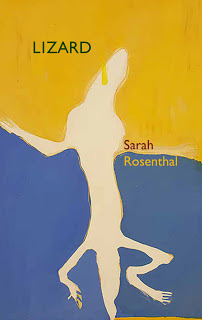 My short review of Sarah Rosenthal's Lizard (Chax Press, 2016) is now online at The Small Press Book Review.
My short review of Sarah Rosenthal's Lizard (Chax Press, 2016) is now online at The Small Press Book Review.
Published on August 09, 2016 05:31
August 8, 2016
Drunken Boat blog "spotlight" series #4: Jason Christie
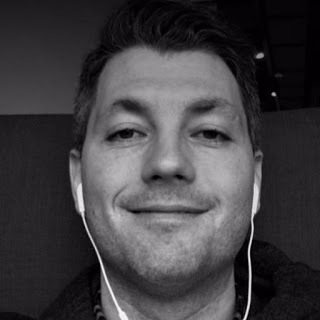 The fourth in my monthly "spotlight" series over at the Drunken Boat blog, each featuring a different poet with a short statement and a new poem or two, is now online:
Ottawa poet Jason Christie
. The first three in the series feature
Montreal poet and performer Kaie Kellough
,
Ottawa poet Amanda Earl
, and
American poet Elizabeth Robinson
. A new post is scheduled for the first Monday of every month.
The fourth in my monthly "spotlight" series over at the Drunken Boat blog, each featuring a different poet with a short statement and a new poem or two, is now online:
Ottawa poet Jason Christie
. The first three in the series feature
Montreal poet and performer Kaie Kellough
,
Ottawa poet Amanda Earl
, and
American poet Elizabeth Robinson
. A new post is scheduled for the first Monday of every month.
Published on August 08, 2016 05:31
August 7, 2016
12 or 20 (second series) questions with Nayomi Munaweera
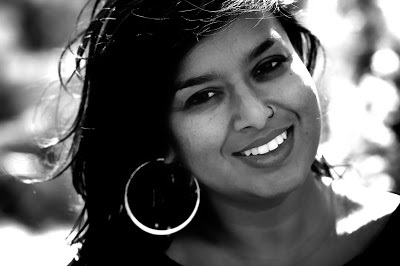 Nayomi Munaweera’s debut novel,
Island of a Thousand Mirrors
was long-listed for the Man Asia Literary Prize and the Dublin IMPAC Prize. It was short-listed for the DSC Prize for South Asian Literature and the Northern California Book Prize. It won the Commonwealth Regional Prize for Asia. The Huffington Post raved, “Munaweera’s prose is visceral and indelible, devastatingly beautiful-reminiscent of the glorious writings of Louise Erdrich, Amy Tan and Alice Walker, who also find ways to truth-tell through fiction. The New York Times Book review called the novel, “incandescent.” The book was the Target Book Club selection for January 2016. Nayomi’s second novel,
What Lies Between Us
was hailed as one of the most exciting literary releases of 2016 from venues ranging from Buzzfeed to Elle magazine. Her non-fiction and short fiction are also widely published. www.nayomimunaweera.com.
Nayomi Munaweera’s debut novel,
Island of a Thousand Mirrors
was long-listed for the Man Asia Literary Prize and the Dublin IMPAC Prize. It was short-listed for the DSC Prize for South Asian Literature and the Northern California Book Prize. It won the Commonwealth Regional Prize for Asia. The Huffington Post raved, “Munaweera’s prose is visceral and indelible, devastatingly beautiful-reminiscent of the glorious writings of Louise Erdrich, Amy Tan and Alice Walker, who also find ways to truth-tell through fiction. The New York Times Book review called the novel, “incandescent.” The book was the Target Book Club selection for January 2016. Nayomi’s second novel,
What Lies Between Us
was hailed as one of the most exciting literary releases of 2016 from venues ranging from Buzzfeed to Elle magazine. Her non-fiction and short fiction are also widely published. www.nayomimunaweera.com.1 - How did your first book change your life? How does your most recent work compare to your previous? How does it feel different?
The first book changed everything. I'm in Sri Lanka now working on a writing and reconciliation program that I love with a writer I grew up reading, Shyam Slevadurai. This kind of thing was unthinkable before the book came out. Trips to Sri Lanka, the country of my birth before publication meant boring visits with gossiping relatives. After the book came out, I come here to do work that feeds both my soul and those of young people wanting to be writers etc. That's just the most obvious answer at this moment.
My second novel What Lies Between Us came out in Feb of this year. Whereas my first, Island of a Thousand Mirrors was the story of a country coming into being, this book is a deeply psychological look at one character- a woman who has committed a terrible crime. Comparing books is like comparing children so I can't tell you one is better. And yet- from the feedback I'm getting from readers- the second is defter and more confident.
The second book felt different in that I had a much better sense of what I was doing. I'm self taught-I dropped out of a PhD program in English to write the first book and really had to stumble through teaching myself how to do it. With the second, I had a much better sense of how to work.
2 - How did you come to fiction first, as opposed to, say, poetry or non-fiction?
I don't think I had a choice. I had to write the books that came to me and swept me along with a sort of undeniable force. I've written some short non-fiction but it's never had as much of a pull. Poetry has never called, although my writing has been called poetic so maybe the distinctions are not really necessary.
3 - How long does it take to start any particular writing project? Does your writing initially come quickly, or is it a slow process? Do first drafts appear looking close to their final shape, or does your work come out of copious notes?
Each book is different. My first was started in 2001 and finished in 2009, published in 2012. As I said, I was really stumbling through the dark teaching myself what to do. I didn't even know I was writing a novel for a long time. The second came quicker because I had a much better sense how to do it, how to manage the usual cycle of self loathing, depression and euphoria that comes with any creative endevor and which is the reason most beginners give up. I'm working on my third now and it's coming much faster. I start with a big messy, ugly, pile of crap and then I shape it over and over and over and over until it is as close to perfection as I can humanly get it- this is never as good as what I dreamed of.
4 - Where does a work of fiction usually begin for you? Are you an author of short pieces that end up combining into a larger project, or are you working on a "book" from the very beginning?
Book- from the beginning.
5 - Are public readings part of or counter to your creative process? Are you the sort of writer who enjoys doing readings?
I think most writers are introverts. I am too. There is such a difference between the deep solitary mental work of writing- there has to be a sort of monastic withdrawal into the inner world to produce work. The other part of the job is to emerge from that world and share your work with the world-give a damn good reading. I try to do that- I think it's important that a writer reads their own work extremely well. If you sound bored by your writing- why wouldn't the audience be? It's an insult to them and to you. A writing teacher told me this early on and I took it to heart. So despite being an introvert I love sharing my work- I'm much better at this-talking to huge groups than small talk at parties- something that seems contradictory but I think many writers feel this way.
6 - Do you have any theoretical concerns behind your writing? What kinds of questions are you trying to answer with your work? What do you even think the current questions are?
Yes of course, I think every writer has concerns. I think my overwhelming question is-what does it mean to live in the world with a female body? What are threats implied, how does one survive? I addressed this in the first book by placing the female body in the context of civil war. In the second book I explore the consequences of childhood trauma and its implications on maternity. I can't talk about the third because I'm still working on it-I will say it's a deep delve into extreme misogeny.
7 – What do you see the current role of the writer being in larger culture? Does s/he even have one? What do you think the role of the writer should be?
Do your work, support other writers, speak up against injustice if that feels necessary to you.
8 - Do you find the process of working with an outside editor difficult or essential (or both)?
My husband is my first reader. I show it to very few other people besides him and always after him. He know exactly how to pick up the threads that I've dropped. My editorial team at St Martin's gets it after and they have been invaluable too. But no one sees the manuscript until it is as perfect as I can get it. I think a lot of projects die because writers show their work too early and get conflicting advice.
9 - What is the best piece of advice you've heard (not necessarily given to you directly)?
Stay humble, do the work. When the audience is clapping- look at their feet. From a renowned human rights activist in Sri Lanka.
10 - What kind of writing routine do you tend to keep, or do you even have one? How does a typical day (for you) begin?
It depends on where I am in the book. If in the midst of writing- I try to keep a 6-8 hour day- starting in the morning. I try to do this- of course many things will happen in that day to put me off track but I do strive for this. I never write at night. I write on a laotop, not longhand, drink coffee not tea.
11 - When your writing gets stalled, where do you turn or return for (for lack of a better word) inspiration?
The beauty of working on a novel is that if one part doesn't work- you can always find a different part to work on. That's what I do- I skip around. If that doesn't work I return to the first and deepest love- reading.
12 - What fragrance reminds you of home?
Jasmine, the sea, the incense that burns in temples. But in America- these are never exact replicas of the scents of Sri Lanka.
13 - David W. McFadden once said that books come from books, but are there any other forms that influence your work, whether nature, music, science or visual art?
Nature is inescapable no? It's the original influence.
14 - What other writers or writings are important for your work, or simply your life outside of your work?
Nabakov, Rushdie, Atwood, Roy. Lionel Shriver, Shyam Selvadurai, Michael Ondatjee.
15 - What would you like to do that you haven't yet done?
Write a third novel!
16 - If you could pick any other occupation to attempt, what would it be? Or, alternately, what do you think you would have ended up doing had you not been a writer?
Gosh! I don't think I have any other real skills. I would have wanted to keep spending my life reading. So very ideally I would have wanted to be a librarian in some lovely library by the sea. I'm picturing a place that might also be a lighthouse. It would be filled with books and rise high into the air- a tower. I would live there, surrounded by books and with some cats. This is a fantasy clearly. In real life- it might get old real quick.
17 - What made you write, as opposed to doing something else?
I didn't have a choice. My first book showed up, crumbled up the life I had before and demanded I write her. It was hugely risky, it took years. It was the best thing I ever did.
18 - What was the last great book you read? What was the last great film?
I'm reading Nabokov's The Gift and it is simply astounding. I've read Lolita numerous times but nothing else of his. Recently I decided to read my way through my small neighborhood library and found this book. It's an original from the 60's. It has a lurid cover of a couple. I think my students think I am reading a romance novel. But it's blowing me away. The depth and density of his prose- you could drown in it. I keep writing down entire sections in my journal hoping a tiny bit of the language magic will sink into my brain. I am in love with him all over again.
As for film- I'm teaching with www.writetoreconcile.com. We take youth from all the ethnicities that suffered through the 30 year civil war here and teach them creative writing skills. Last night we all watched Pan's Labyrinth , the gorgeous movie about the Spanish civil war. I've seen it before but I was crying along with the students- just an utterly incredible piece of art.
19 - What are you currently working on?
Third novel! Can't tell you anything more. :)
12 or 20 (second series) questions;
Published on August 07, 2016 05:31
August 6, 2016
another weekend in old glengarry:
 We spent the August long weekend on the homestead again, for the sake of both the Glengarry Highland Games and my sister's annual bbq (my daughter Kate was working, and unable to come this year). Driving straight to the fairgrounds in Maxville on Saturday morning, we managed to miss my niece Rory singing at 10am (it takes forever to get out of the house, as you might imagine), but caught the Clan Parade again this year. I think the MacLennan contingent quite enjoys when my sister Kathy and I arrive with our broods, given we swell the ranks by at least three times when we do.
We spent the August long weekend on the homestead again, for the sake of both the Glengarry Highland Games and my sister's annual bbq (my daughter Kate was working, and unable to come this year). Driving straight to the fairgrounds in Maxville on Saturday morning, we managed to miss my niece Rory singing at 10am (it takes forever to get out of the house, as you might imagine), but caught the Clan Parade again this year. I think the MacLennan contingent quite enjoys when my sister Kathy and I arrive with our broods, given we swell the ranks by at least three times when we do.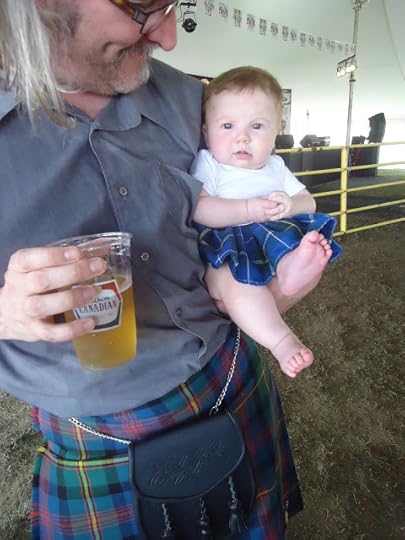 Unlike last year, we didn't manage to catch any photos of us standing behind the banner as part of the parade. The year prior, we didn't even know the parade was an option.
Unlike last year, we didn't manage to catch any photos of us standing behind the banner as part of the parade. The year prior, we didn't even know the parade was an option.Rory, at least, sang again later on in the day: we caught that (and found out it was the same set as they'd done earlier).
We walked as part of the parade, and then saw Rory dance as part of the opening ceremonies. After that, I managed to convince everyone over to the beer tent. I mean, they had shade, and benches where Christine could nurse Aoife, after all...
Ah, me. Aoife's first beer enclosure.
And of course I wore my kilt. Where else might I even be able to? Aoife wore the onesie with Nova Scotia tartan we'd picked up for Rose a couple of years back, and Rose wore her more recent kilt.

 I'd hoped to actually catch some of the competitions again this year, unlike the past two years, but we didn't quite make it. From the beer tent, it was the kid's area, where Rose's cousin Emma helped her feed some goats (and we too had some kind of lunch).
I'd hoped to actually catch some of the competitions again this year, unlike the past two years, but we didn't quite make it. From the beer tent, it was the kid's area, where Rose's cousin Emma helped her feed some goats (and we too had some kind of lunch).Rory was singing at 2:30pm, back by the Clan Barns, so we headed that way. Once that was over, toddler Rose, despite the ice cream, was starting to melt down (her lack of nap wasn't helping), so we wandered back to the farm. But not, of course, before I managed to snag a new t-shirt (I'd hoped for one for Rose, but they were long out of kid sizes).
 Later that night, as I put Rose to bed (which, sans nap, was far easier than it should have been), I settled her with the lamb that had been my father's, when he was wee.
Later that night, as I put Rose to bed (which, sans nap, was far easier than it should have been), I settled her with the lamb that had been my father's, when he was wee.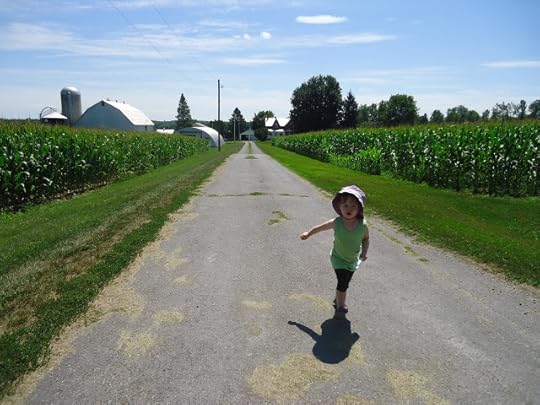
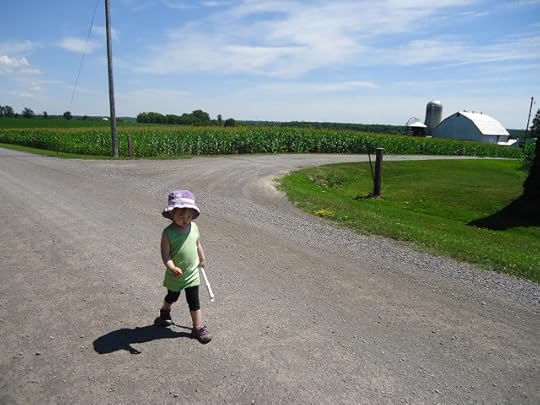 I'll admit I was enjoying that Rose kept playing with my father at the house, not necessarily giving him an option for a tea party, or one of her games, or colouring. He wasn't the most hands-on with any of us, seeming more awkward about playing with small children, but Rose was undeterred.
I'll admit I was enjoying that Rose kept playing with my father at the house, not necessarily giving him an option for a tea party, or one of her games, or colouring. He wasn't the most hands-on with any of us, seeming more awkward about playing with small children, but Rose was undeterred.On Sunday, we headed across the road to my sister's house for her annual bbq. Given we'd purchased Rose a recorder (we were calling it a "flute") to keep her settled during a dollar-store run en route to the Games, she and I walked over as Christine and Aoife drove, so Rose could play it as loud as she could (she'd felt stymied by our suggestions to play it softly in the house; neither my father nor Christine were impressed with her constant playing). I HAD HER PLAY IT VERY LOUD.
My father asked: You're going to take that with you, aren't you?
She enjoyed catching her own echo from the trees, so she yelled: Hah! Hah! Hah!
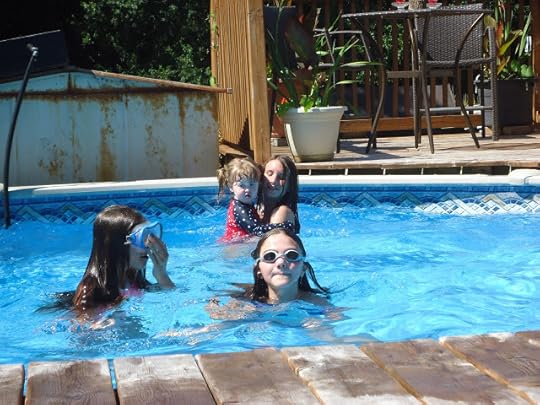
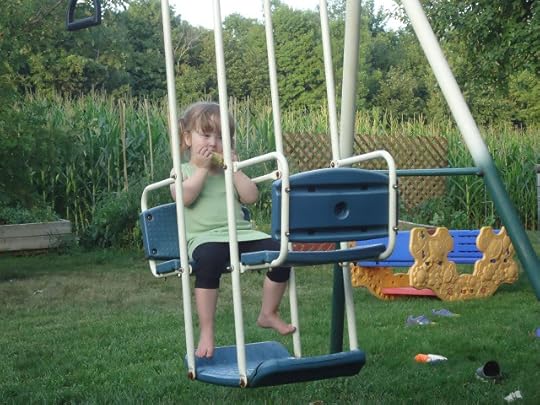 Once at my sister's, there was the trampoline, and the pool (and the massive spit, where the pig was being roasted). And the garden. And a bunch of other kids, of various ages. Rose played with a little boy, Phoenix, who seemed maybe eight months younger than her, for most of the day.
Once at my sister's, there was the trampoline, and the pool (and the massive spit, where the pig was being roasted). And the garden. And a bunch of other kids, of various ages. Rose played with a little boy, Phoenix, who seemed maybe eight months younger than her, for most of the day.Emma accompanied her into the pool for a bit, before she tired of it, and I took over. It was a struggle to finally convince her to come out.
Rose loved corn. More than a couple of times, she simply served herself, picking another cob or half-cob from the plate. She spent the whole day either running, or playing upon the trampoline.
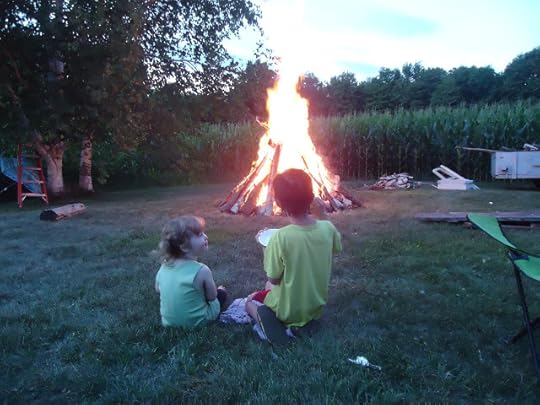
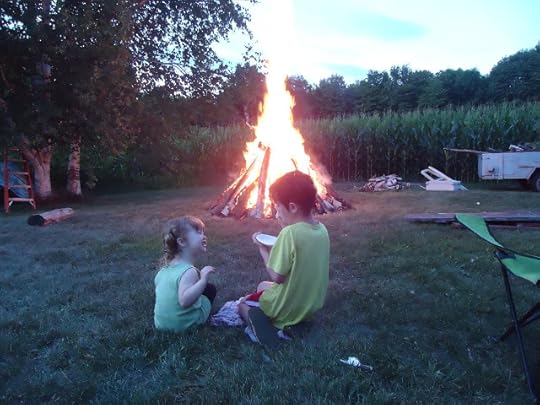 And then there was dusk, when the fire began. Rose sat for a bit with her cousin Duncan.
And then there was dusk, when the fire began. Rose sat for a bit with her cousin Duncan. Before both young ladies crashed. Aoife on me, and Rose on Christine's back. Rose slept through the incredibly-loud fireworks, but Aoife woke; the fireworks were impressive (set off around 10pm), but once finished, we sauntered back to the homestead. Aoife yelled the whole way.
Before both young ladies crashed. Aoife on me, and Rose on Christine's back. Rose slept through the incredibly-loud fireworks, but Aoife woke; the fireworks were impressive (set off around 10pm), but once finished, we sauntered back to the homestead. Aoife yelled the whole way.The next morning, I went first thing for coffee etc at the Tim Horton's on Highland Road, and discovered a truck had missed a curve and plowed into a row of trees. The front was caved in, the passenger door ajar and the truck was sitting on a row of stumps, making it impossible to move (they've been expanding boundary road lately). Hoping the driver was okay. Presuming a middle of the night event. By the time I returned with coffee, there was already someone checking out the truck. By the time we were leaving, the truck had disappeared and a cop car was resting nearby.
My father didn't recognize the description of the truck.
 Before heading home, we wandered east and south into Lancaster, and towards Cooper Marsh. I thought it might be more interesting to have a bit of running around for the toddler, instead of simply driving straight back to the house.
Before heading home, we wandered east and south into Lancaster, and towards Cooper Marsh. I thought it might be more interesting to have a bit of running around for the toddler, instead of simply driving straight back to the house.While looking at flowers, she insisted on doing some kind of 'flower-dance' (instead of allowing me to take a still photo).
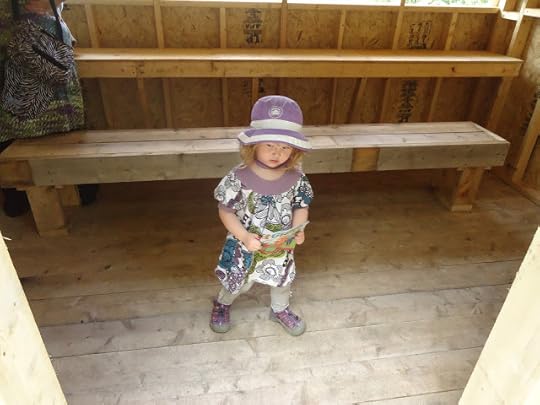 We walked through some of the paths, and Rose ran and ran and stopped occasionally to colour and then ran and then insisted upon being carried again and then put down and then carried again (meaning Christine had to re-build her particular carrier-wrap once more), etcetera.
We walked through some of the paths, and Rose ran and ran and stopped occasionally to colour and then ran and then insisted upon being carried again and then put down and then carried again (meaning Christine had to re-build her particular carrier-wrap once more), etcetera.And then it was Dairy Queen in South Lancaster for lunch, before both girls slept the bulk of the drive home.
Published on August 06, 2016 05:31
August 5, 2016
the return of rob mclennan's poetry workshops: August-October, 2016
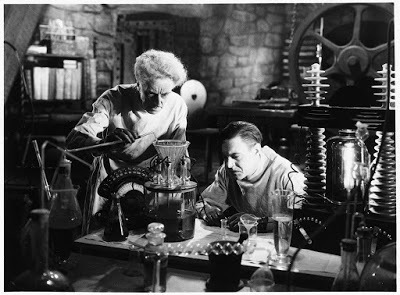 After nearly a year, I return once again to offering poetry workshops. Originally held at Collected Works Bookstore and Coffeebar, this session will be held upstairs at The Carleton Tavern, 223 Armstrong Street (at Parkdale).
After nearly a year, I return once again to offering poetry workshops. Originally held at Collected Works Bookstore and Coffeebar, this session will be held upstairs at The Carleton Tavern, 223 Armstrong Street (at Parkdale).The workshops are scheduled for Sunday afternoons, 2-4:30pm: August 28; September 11, 18 + 25; October 2 + 16.
$200 for 6 sessions.
for information, contact rob mclennan at rob_mclennan@hotmail.com or 613 239 0337;
The course will focus on workshopping writing of the participants, as well as reading various works by contemporary writers, both Canadian and American. Participants should be prepared to have a handful of work completed before the beginning of the first class, to be workshopped (roughly ten pages).
Participants over the past few years have included: Amanda Earl, Frances Boyle, Chris Johnson, Roland Prevost, Christine McNair, Pearl Pirie, Sandra Ridley, Marilyn Irwin, Rachel Zavitz, Janice Tokar, Dean Steadman, N.W. Lea, David Blaikie, James Irwin, Claire Farley, Barbara Myers and Marcus McCann.
For those unable to participate, I still offer my ongoing editorial service of poetry manuscript reading, editing and evaluation.
http://www.robmclennan.blogspot.ca/2014/07/robs-ongoing-editing-service-poetry.html
Born in Ottawa, Canada’s glorious capital city, rob mclennan currently lives in Ottawa, where he is home full-time with the two wee girls he shares with Christine McNair. The author of nearly thirty trade books of poetry, fiction and non-fiction, he won the John Newlove Poetry Award in 2010, the Council for the Arts in Ottawa Mid-Career Award in 2014, and was longlisted for the CBC Poetry Prize in 2012. In March, 2016, he was inducted into the VERSe Ottawa Hall of Honour. His most recent titles include notes and dispatches: essays (Insomniac press, 2014), The Uncertainty Principle: stories, (Chaudiere Books, 2014) and the poetry collection If suppose we are a fragment (BuschekBooks, 2014). An editor and publisher, he runs above/ground press, Chaudiere Books, The Garneau Review (ottawater.com/garneaureview), seventeen seconds: a journal of poetry and poetics (ottawater.com/seventeenseconds), Touch the Donkey (touchthedonkey.blogspot.com) and the Ottawa poetry pdf annual ottawater (ottawater.com). In fall 2015, he was named “Interviews Editor” at Queen Mob’s Teahouse, and recently became a regular contributor to both the Drunken Boat and Ploughshares blogs. He spent the 2007-8 academic year in Edmonton as writer-in-residence at the University of Alberta, and regularly posts reviews, essays, interviews and other notices at robmclennan.blogspot.com
Published on August 05, 2016 05:31
August 4, 2016
12 or 20 (second series) questions with Sue Landers
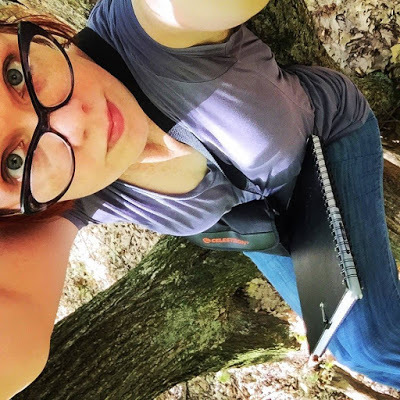 Sue Landers' latest book,
FRANKLINSTEIN
, tells the story of one Philadelphia neighborhood wrestling with the legacies of colonialism, racism, and capitalism. She is also the author of 248 MGS., A PANIC PICNIC and
COVERS
. Her chapbooks include
15:A Poetic Engagement with the Chicago Manual of Style
and WhatI Was Tweeting While You Were On Facebook. She was the founding editor of the journal
Pom2
and has an MFA from George Mason University. She lives in Brooklyn. Follow her on Twitter @suelanders or visit susanlanders.tumblr.com.
Sue Landers' latest book,
FRANKLINSTEIN
, tells the story of one Philadelphia neighborhood wrestling with the legacies of colonialism, racism, and capitalism. She is also the author of 248 MGS., A PANIC PICNIC and
COVERS
. Her chapbooks include
15:A Poetic Engagement with the Chicago Manual of Style
and WhatI Was Tweeting While You Were On Facebook. She was the founding editor of the journal
Pom2
and has an MFA from George Mason University. She lives in Brooklyn. Follow her on Twitter @suelanders or visit susanlanders.tumblr.com.1 - How did your first book or chapbook change your life? How does your most recent work compare to your previous? How does it feel different?While I enjoyed writing my first two books— 248 mgs., a panic picnic and Covers —writing my latest book, Franklinstein , was a completely different experience. Franklinstein is a hybrid-genre collection about the historic, predominantly black neighborhood in Philadelphia, where I grew up.
Over the course of four years, I researched the neighborhood’s history and interviewed its residents. I wanted to understand and articulate how a neighborhood, particularly one impacted by centuries of structural racism, evolves over time. I was also exploring my personal connection to the neighborhood’s history, as a white person who grew up there, poor, but with privilege.
The whole writing process was interactive, social, and exploratory. The process of making this book was, truly, nothing short of amazing. I remember one day in particular, I was sitting on a park bench when I met a woman, Terri Lyons, who told me about her mother’s passing and how her mother was “half her heart.” This was within the first fifteen minutes of meeting each other, after we found out we shared an interest in poetry. I felt so overwhelmed with gratitude for how poetry, and the process of writing it, can bring people—complete strangers—into each others’ lives.
2 - How did you come to poetry first, as opposed to, say, fiction or non-fiction?One of the things that I love about poetry is how it approaches the ineffable. Through poetry we can almost articulate how impossible it is to describe all the unfathomable beauty and injustice in our world. While fiction and non-fiction, obviously, can describe the world, there is something about how poetry fails as much as it succeeds which strikes me as more apt, poignant, and powerful.3 - How long does it take to start any particular writing project? Does your writing initially come quickly, or is it a slow process? Do first drafts appear looking close to their final shape, or does your work come out of copious notes?Each of my books took years to write, mostly because I write in fits and starts, full of interruptions, the most significant of which is my full-time, non-poetry-related job. But I am also a big fan of writing something then putting it down for days or weeks, so I can edit it with fresh eyes. And, well, I also get distracted by TV.
4 - Where does a poem or work of fiction usually begin for you? Are you an author of short pieces that end up combining into a larger project, or are you working on a "book" from the very beginning?All three of my books contain, or are, sequences so I think I fall pretty squarely in the “project” camp. That said, I never know at the very beginning what a book will be – it’s just that after writing a few pieces I start thinking about how they fit together and what they might add up to.
5 - Are public readings part of or counter to your creative process? Are you the sort of writer who enjoys doing readings?A big part of my editing process is reading my work aloud so I can hear and adjust the poem’s music. And I love giving readings. Giving readings from Franklinstein while the book was in progress was an integral part of my writing process. Because the book is about a neighborhood I no longer live in, I felt a particular responsibility to “do right” by those currently living there, those whose home I was describing. Thinking about current residents as my primary audience, and then sharing my work with them as I wrote the book, provided me with much needed feedback and perspective.
6 - Do you have any theoretical concerns behind your writing? What kinds of questions are you trying to answer with your work? What do you even think the current questions are?I think my work has always, in some way, been interested in memory and history, nostalgia and misperception, social injustice, identity, and how to live in a world of seemingly limitless yet limited information. And in Franklinstein I had a vehicle to explore those ideas in very concrete ways—by getting to know a neighborhood, its people, and all the different forces that shaped it over time. I probably learned more about American history in the past few years than I ever did in school because I was able to see first hand the consequences of the history I was studying. And I think this book works in concert with other behaviors in American literature right now, where writers are processing the objective and subjective, the quantitative and qualitative, data and emotion, in incredibly powerful and insightful ways.
7 – What do you see the current role of the writer being in larger culture? Does s/he even have one? What do you think the role of the writer should be?I think great poetry helps us see and understand the world differently and in that way provides us with the perspective we need to be better people and citizens.
8 - Do you find the process of working with an outside editor difficult or essential (or both)?Absolutely essential. One of my closest readers is the terrific poet, Allison Cobb, who is that rare gem of an editor who finds both the macro and micro-level issues with a piece, or a collection of poems. I also had an incredible experience working with James Sherry on Franklinstein. He is an incredibly astute reader, and asked me a litany of very difficult questions that helped me approach my revisions in ways that made the book stronger.
9 - What is the best piece of advice you've heard (not necessarily given to you directly)?advice you ever received?
After college I was fortunate to get a full scholarship to Washington University’s MFA program. Pretty soon into the first year, though, I realized the program was not a good fit for me. But after going into debt by putting myself through college, it didn’t seem right to look a gift horse in the mouth. So I asked my mother for advice. My mother raised eight children, several as a single parent on SSI after our father had died. She had only gone to high school herself, knew how to stretch a penny, and believed education was a necessary step towards prosperity. So when I told her about my dilemma, I was sure she would tell me to just suck it up, but surprisingly, she said, “Susie, if someone offered you all the butterscotch vanilla ice cream in the world—and it was totally free—but you hated butterscotch vanilla, would you eat it?” And with that my decision was made—a decision I do not regret one bit.
10 - How easy has it been for you to move between genres (poetry to prose)? What do you see as the appeal?I love reading and writing hybrid forms because there are different freedoms in both. Prose is great when I want to describe or argue something with accuracy. Poetry helps me manifest or evoke an emotion with precision.
11 - What kind of writing routine do you tend to keep, or do you even have one? How does a typical day (for you) begin?Except for the time I spent at a writing residency or the period I worked part-time in order to finish my manuscript, I have never been able to stick to a writing routine. I try to write on the subway to work, or on weekends, or on vacation, so that over time, the pieces add up.
12 - When your writing gets stalled, where do you turn or return for (for lack of a better word) inspiration?When I was writing Franklinstein I had two fail-safe ways to get unblocked (and one consistently unsuccessful method—looking in the refrigerator—but I digress). The first was turning off the computer and taking a walk. Without fail, whatever I was getting hung up on would break loose with a walk around the block. The second was turning to other writers for language, specifically, Ben Franklin and Gertrude Stein. When stuck, I would think about the one word that I was either stuck on or that represented the nature of the problem I was having, and then search the electronic versions of The Autobiography of Benjamin Franklin or The Making of Americans for that word. More times than not, Ben or Gertie would use that word in a way that got me thinking about it, and my problem, differently.
13 - What fragrance reminds you of home?Celery and onions sautéed in butter.
14 - David W. McFadden once said that books come from books, but are there any other forms that influence your work, whether nature, music, science or visual art?As a non-driver, walking is a vital part of my everyday life and my writing practice. Walking influenced Franklinstein, for sure, since part of getting to know the neighborhood again, part of my research was walking around it. But also, my research involved libraries and archives. Before starting this book, it had been years since I had actually used a library. And I forgot how part of using a library is walking down a corridor, or up a flight of stairs, or waiting for a book to come from somewhere else. How part of using a library is not getting an answer right away. And in that walking and waiting, I thought about writing. To walk around it while thinking it through.
15 - What other writers or writings are important for your work, or simply your life outside of your work?The poets who mean the most to me right now, who inspire me with their unique and powerful voice are Claudia Rankine, Alice Notley, and Dana Ward.
16 - What would you like to do that you haven't yet done?I should probably learn to swim one of these days.
17 - If you could pick any other occupation to attempt, what would it be? Or, alternately, what do you think you would have ended up doing had you not been a writer?I come from a family of artists who don’t claim that identity in full. A musician who teaches. The lawyer who paints. The scrapbook admin. A wine guy who cooks. I suspect that if it wasn’t writing, I would take up some other art form either as a hobby or as profession if I could make money from it. I really wish I could sing. To be Kim Deal or Beyonce. Chan Marshall or Bjork. Gawd, that would be terrific.
18 - What made you write, as opposed to doing something else?Teenage depression made me start writing bad poems. Hearing Lisa Jarnot read at Bridge Street Books in graduate school made me start writing less bad poems. Wanting to make sense of the world we live in makes me keep writing.
19 - What was the last great book you read? What was the last great film?I’m really enjoying the Elena Ferrante novels right now. Her ability to capture the psyches of adolescent girls, living in poverty, is bracingly accurate. I rarely watch movies, but I do love TV. These days I am particularly delighted by Taraji Henson on Empire—she’s a terrific actress, and my god, the costumes, the melodrama—the way she flicked off that netted crystal veil to rush to her son’s aid after he was shot on the red carpet! Oh!
20 - What are you currently working on?I am writing occasional poems and day-book like pieces, pieces that range from reflections on my daily morning commute through the World Trade Center to that day I came down with appendicitis (ouch!) to that time actress Michelle Williams moved into my Brooklyn neighborhood. Only time will tell how these events add up.
12 or 20 (second series) questions;
Published on August 04, 2016 05:31
August 3, 2016
above/ground press : summer sale on 2016 (so far) titles!
 Given my hopes that Canada Post won't actually have that near-threatened mail strike, I'm celebrating
their recently-announced re-attempts at negotiation
with a summer sale! [unrelatedly, as you know, I've also been pulling out an absolute TON of backlist that is still available in very small amounts]
Given my hopes that Canada Post won't actually have that near-threatened mail strike, I'm celebrating
their recently-announced re-attempts at negotiation
with a summer sale! [unrelatedly, as you know, I've also been pulling out an absolute TON of backlist that is still available in very small amounts]Until the end of August, 2016: you can have any five above/ground press 2016-so-far titles for $20 (plus shipping; rates below). That work? I've made a ton of things so far this year!
Titles in the current sale include:
10 Poems
Christian Bök
Taxicab Voice
Neil Flowers
NEW LIFE
Stephen Collis
Touch the Donkey : tenth issue,
with new poems by Meredith Quartermain, Mathew Timmons, Renée Sarojini Saklikar, Luke Kennard, Shane Rhodes and Amanda Earl.
Partial List of Things I’m Responsible For
Lesley Yalen
ERASURE: A Short Story
Braydon Beaulieu
King Kong
rob mclennan
Three Bloody Words : Twentieth Anniversary Edition
Stephanie Bolster
A New Love/ An Aching Stone
A double-cento out of Yehuda Amichai & Mahmoud Darwish
Pete Smith
Vesper Vigil
Bronwen Tate
Odds Are
lary timewell
After the Battle of Kingsway, the bees—
~ from volume 2 of thecanadaproject, The Heart of This Journey Bears All Patterns, commonly known as Thot-J-Bap, a long poemRenée Sarojini Saklikar
Touch the Donkey : ninth issue,
with new poems by Stephen Collis, Laura Sims, Paul Zits, Eric Schmaltz, Gregory Betts, Anne Boyer, Sarah Cook and François Turcot (trans. Erín Moure).
A Copyist, an Astronomer, and a Calendar Expert
Sarah Mangold
panpiped panacea / панацея, ten poems by Yuri Izdryk
translated from the Ukrainian by Roman Ivashkiv and Erín Moure
the vitamins of an alphabet
Sean Braune
snake charmers : a cycle of twenty poems
Kristjana Gunnars
Touch the Donkey : eighth issue,
with new poems by Mary Kasimor, Billy Mavreas, damian lopes, Pete Smith, Sonnet L’Abbé, Katie L. Price, a rawlings and Gil McElroy.
from Lamentations
Robert Hogg
Second (expanded) edition
A Precarious Life on the Sea
Sarah Burgoyne
To order, send cheques (add $1 for postage; outside Canada, add $2) to: rob mclennan, 2423 Alta Vista Drive, Ottawa ON K1H 7M9 or paypal at www.robmclennan.blogspot.com :
Also: forthcoming titles include new chapbooks by Carrie Hunter, George Bowering, Geoffrey Young and John Barton. Watch for details soon on the big twenty-third anniversary launch/reading/party, as well as the usual fall notice for 2017 subscriptions! And for further backlist, check out the link-list of names on the sidebar, just to the right, at: http://abovegroundpress.blogspot.ca/
Don't go, Canada Post, we love you! (but you need to pay people fairly and get rid of the guy at the top. I mean, really...
Published on August 03, 2016 05:31



